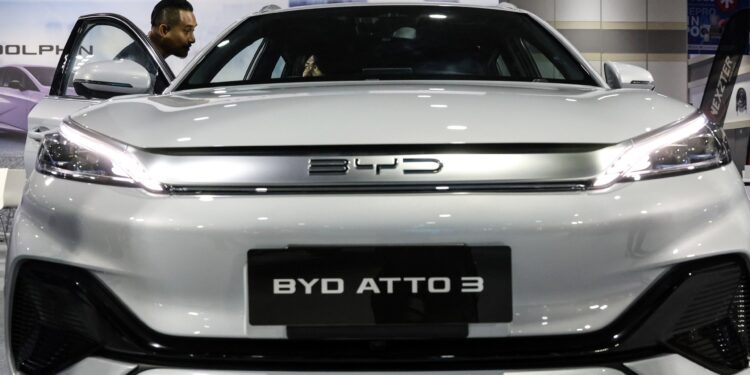The Turkish presidency said that Chinese carmaker BYD has signed an agreement to build a factory in Türkiye.
The agreement, signed by the company with Turkish Industry and Technology Minister Fatih Kacır in the presence of Turkish President Recep Tayyip Erdogan, includes an investment of $1 billion and the opening of a factory with a production capacity of 150,000 cars annually, according to the ministry.
Earlier, the Turkish president received the company’s chairman Wang Chuanfu, according to photos published by the Turkish presidency.
The location of the factory has not been determined, but it is expected to be on state-provided land in Manisa province near the coastal city of Izmir, according to observers.
Escape from European taxes
Analysts believe that setting up a factory in Turkey will allow the company to access the European market by circumventing EU taxes on Chinese electric cars.
The European Union last week temporarily imposed additional tariffs of up to 38% on imported Chinese electric cars over what it calls “unfair” government subsidies, amid warnings from Beijing that the move could spark a trade war.
The European Union is seeking to encourage more Europeans to drive electric cars, as it plans to ban the sale of new fossil fuel-powered cars from 2035.
The share of Chinese-made cars in EU electric vehicle sales has risen from about 3% to more than 20% in the past three years, according to the European Automobile Manufacturers Association.
customs fees
The European Union launched an investigation last year into whether Chinese government support for electric vehicles unfairly disadvantaged European carmakers.
Since announcing plans to raise the tariffs last month, which are in addition to the current 10% import duty, the European Commission has begun talks with Beijing to try to resolve the issue, while China has threatened to retaliate.
The Chinese Chamber of Commerce to the European Union denounced the imposition of customs duties, considering them “politically motivated” and “protectionist”, while expressing its hope that the dispute could be resolved through dialogue.
The new tariffs will go into effect on Friday, with a final five-year term to be imposed in November, after a vote by the 27 EU members.



